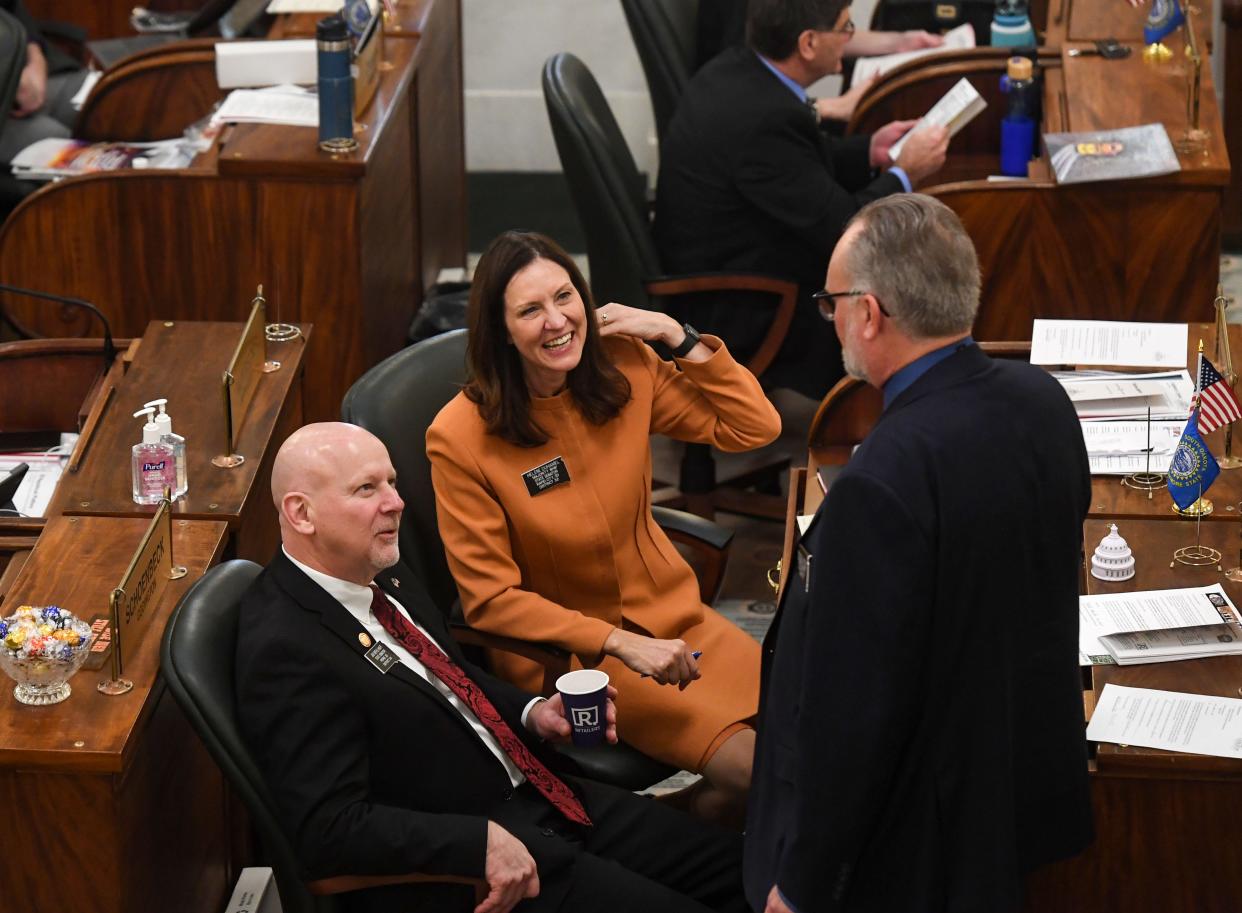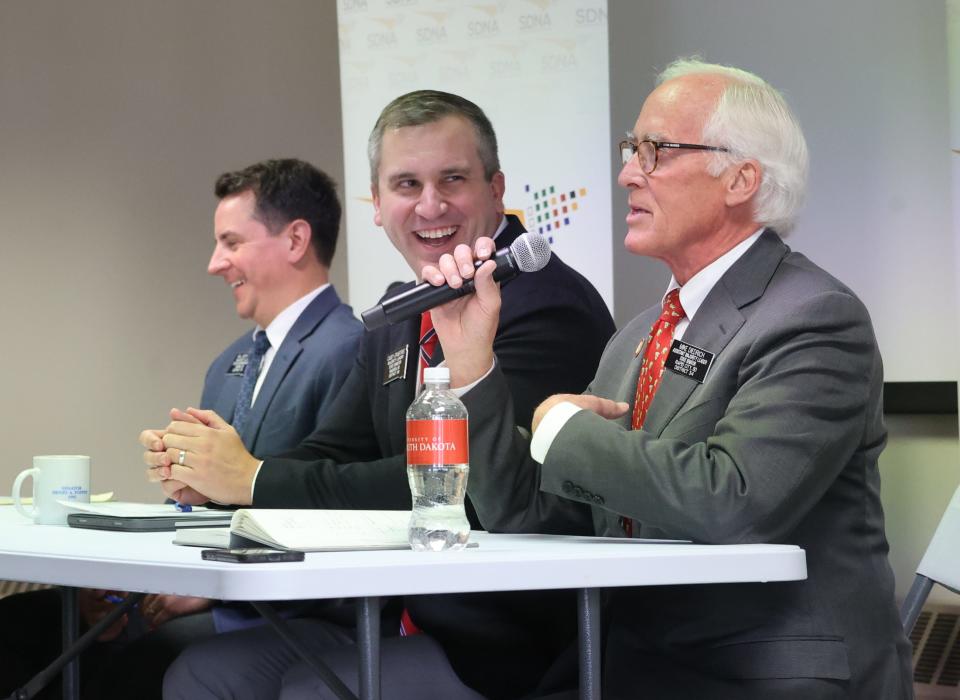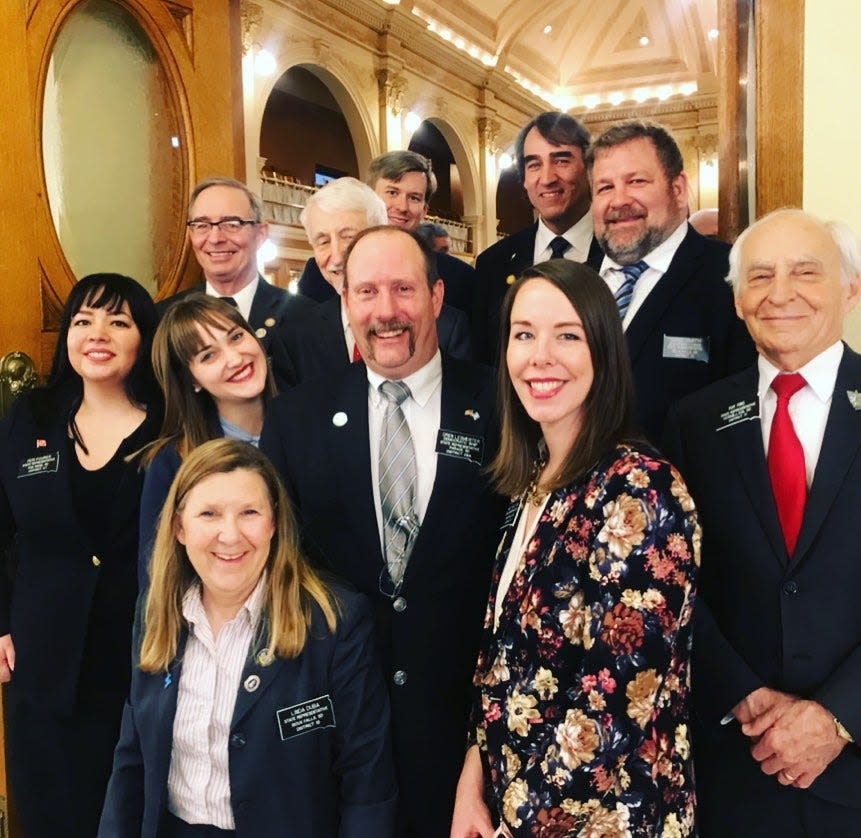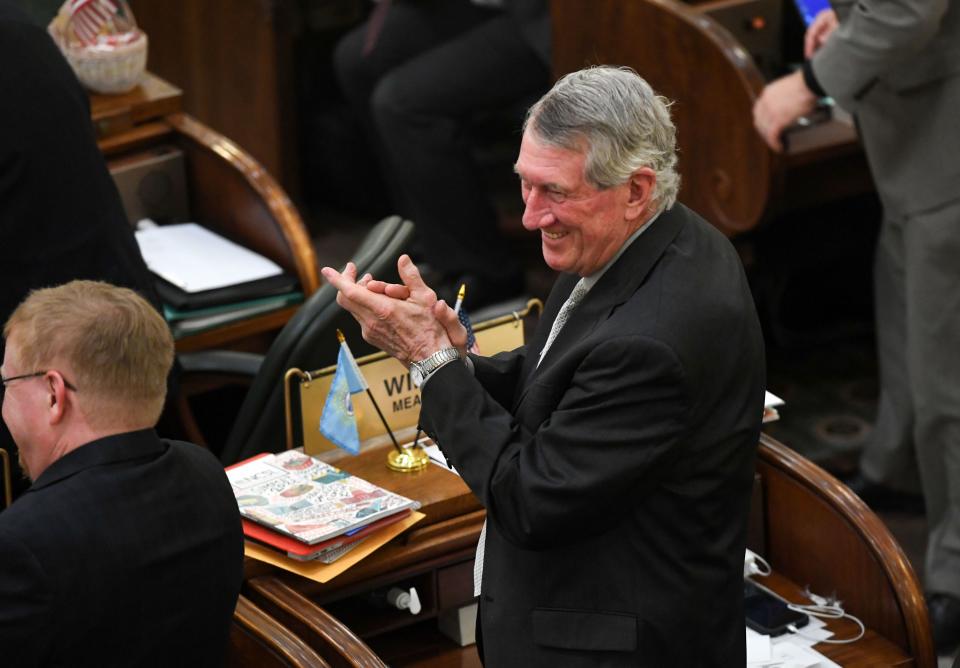Observers see improved civility in Capitol in 2023

- Oops!Something went wrong.Please try again later.
- Oops!Something went wrong.Please try again later.
As it winds to a close, the 2023 legislative session in South Dakota will likely be remembered as the year of the great tax cut debate and for the somewhat surprising willingness of the GOP-led Legislature to reject several proposals from a popular Republican governor.
But many observers and participants in the process are noting another significant milestone this year: a noticeable return to civility, decorum and cordiality in the state Capitol.
Tim Rave is a health care lobbyist who served 13 years in the South Dakota Legislature in the early 2000s, including as speaker of the House and Senate majority leader.
Rave said the legislative process in 2023 so far has been “very enjoyable and smooth” due to the new spirit of civility and cordiality, even during heated policy debates.

“It is markedly different than it has been the past four or five years,” Rave said. “You’ve seen the House and Senate come together, and even when they don’t come together on issues, there’s just a more cordial, respectful debate among the chambers.”
The results of the improved civility are hard to pin down, but observers and lawmakers say policy debates are more respectful and reasoned, that the process is running on time, that there’s a greater sense of bipartisanship, and that the bills ultimately sent to Gov. Kristi Noem for signing are better vetted and stronger in intent and outcome.
The more diplomatic approach this session comes six months after concerning results from a statewide poll conducted by News Watch in July 2022 showing that a wide majority of South Dakotans felt that civility was on the decline in American society and government. In the poll of 500 registered South Dakota voters, 79% said civility had gotten worse in America in the past five years and less than 3% said civility had improved during that time.
Rep. Will Mortenson, R-Pierre, the majority leader in the House of Representatives, said he has tried to improve civility and decorum in the House by implementing what he calls “the new old-fashioned way” of legislating.
More:What will it take for South Dakota to have a culturally responsive civics and history curriculum?
“It might be new compared to the last four years, but I really view my job and my goal as restoring some of the positive traditions of legislating that we’ve have had in South Dakota for decades,” Mortenson told News Watch. “I care a lot about the history of the place and the traditions. They take decades to build and only a few years to destroy, and I came to keep the good ones going.”
Nearly 55% of the 2022 poll respondents said political leaders were most responsible for setting the tone of civility in the state and nation.

Their concerns seemed manifest early this session when state Sen. Julie Frye-Mueller, R-Rapid City, was censured by her colleagues after what was reported as an inappropriate heated conversation about “private paternal matters” with a legislative research staff member.
Republican Sen. Lee Schoenbeck of Watertown, the president pro tempore of the Senate, suspended Frye-Mueller and acted quickly to address the incident. Frye-Mueller was censured, then reinstated to office, and her subsequent legal attempts to strike back at colleagues who supported her suspension have fizzled.
State Sen. Helene Duhamel, R-Rapid city, said stronger leadership in Pierre — especially in the House — has led to greater decorum in the lawmaking process this year.
Duhamel, R-Rapid City, who has served since 2019, said part of the blame for the great division in our country and state can be traced to the behavior of former President Donald Trump, who laid derision and derogatory nicknames on people who disagreed with him.
“Part of the problem with the Trump presidency was that it became OK to be disagreeable when you disagree. … It became OK to call people names, and I think that has trickled down and caused us issues in our state,” she said.
“We should be statesmen and we should behave as statesmen. … If you don’t treat people well, how in the world do you ever expect to work with them and find a compromise or have them see your point of view?" Duhamel added.Rep. Oren Lesmeister, a Democrat from Parade, is in his fourth term in the House of Representatives and said he has noticed a clear shift in how lawmakers of both parties have approached one another and the lawmaking process this session.
“There’s a lot more communication, and there’s a lot more civility,” said Lesmeister, the minority leader in the House.Lesmeister said leaders in both chambers and in both parties have shown a greater willingness this session to focus more on legislating than grandstanding or trying to draw attention to themselves.

“I would say it comes down to personalities, and in past years we’ve had some big personalities that have kind of fed off of that,” he said. “We’ve still got people with big personalities. But this year, I would say there’s a greater sense that maybe the best way to get to the same place we’re all trying to get to anyway, better than barking and hollering, is to sit down and have a conversation.”
Rave attributes the new vibe to strong leadership in the chambers but also to a large group of first-year legislators who have engaged in the process with vigor and a greater reverence for the process of respectful debate. The legislative roster includes 11 new senators and 31 new representatives, though some of those lawmakers served in the other chamber in the past.
“There’s been an influx of some really, really solid new legislators who have brought a whole level of statesmanship,” he said. “They’re just really strong people who are going to be leaders in these chambers for years to come.”
Rave added that during his two decades in Pierre as a lawmaker and lobbyist, it hasn’t been uncommon for the Legislature to stand against measures supported by a sitting governor, so he is not taken aback by the rejection of some measures supported by Noem this session.
More:98th regular Legislative session ends with historic tax cut, funding increases
U.S. Sen. Mike Rounds, R-S.D., said he spent a week in Pierre in February and met with members of both the Republican and Democratic caucuses in the Legislature and noted that he sensed cohesiveness this session among the opposing parties.
“I’m hoping that that is the way things are beginning to work in South Dakota,” he said.Rounds added that lawmakers in both parties get along and work together well in the U.S. Senate, often dining and praying together.
Shane Nordyke, a University of South Dakota political science professor, said she has still seen the 2023 South Dakota Legislature focus significantly on social issues rather than substantive policy.
“Certainly the legislation they’re bringing is as divisive as it’s ever been,” she said. “Just because they’re getting along better doesn’t necessarily mean they’re passing legislation that is making the lives of South Dakotans better.”Nordyke said there’s an important distinction to be made between debate and disagreement and uncivil behavior, and that it’s a positive outcome if a feeling of greater civility is permeating state government this session.“The political process is designed to be inherently contentious,” she said. “That doesn’t mean it has to be uncivil or mean and nasty.”
— This article was produced by South Dakota News Watch, a non-profit journalism organization found online at SDNewsWatch.org.
This article originally appeared on Sioux Falls Argus Leader: Observers see improved civility in Capitol in 2023

